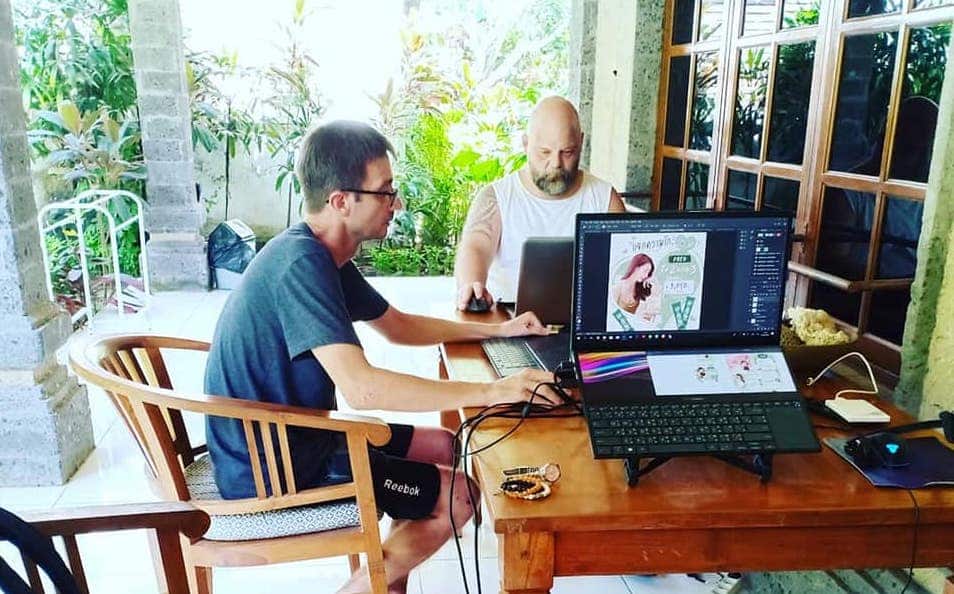The gig economy, where you have no permanent employment but work from project to project, and the phenomenon of digital nomads, where you also do not have a permanent residence, is snowballing. Here is the story of Dane Benny Holgaard, who runs his business while exploring the world.

Benny Holgaard is in Cordova in the Philippines when I call. Because of the Corona crisis, he is grounded and unable to move on. For how long, he doesn’t know. However, it does not affect his business. As long as there is a WiFi or cellular signal, he’s up and running.
Benny runs the company shoptech.media, and I got his contact information from Estonian XOLO, which is one of the case studies in my upcoming book Going Global on a Shoestring. We have mailed a bit back and forth to find a time to talk that suits both of us.
Originally, I was just going to get a few quotes about Benny’s experiences with XOLO. However, as the conversation progressed, a fascinating story unfolded. A story about a worldwide trend; digital nomads and the gig economy, but also a story about how to pursue and find harmony and happiness.
Danish pastries made in Silkeborg
Benny is originally a baker from Silkeborg, and for four years, after finishing his apprenticeship, he baked bread while the rest of us slept. Then he worked at a factory for eight years before discovering his fascination for IT. From the mid-nineties, he was busy building PCs and working with software when in 2003 his wife announced that she wanted a divorce.
“That divorce came as a shock to me,” Benny says. “It reset my entire life, and it took some time before I found my bearings again. I started studying psychology, coaching and NLP and worked with, among others, refugees who were traumatized by war experiences.”
After Apple launched its iPhone in 2007, Benny returned to IT and began working with apps. He became very active on amino.dk (a popular website for small businesses in Denmark), made contacts within the entrepreneurial community and established himself as a freelance app developer.
E-commerce and webshops
Through his clients, Benny was increasingly exposed to issues surrounding E-commerce and webshops. As he both found it wildly exciting and apparently also had a flair for it, this eventually became his focus area.
“It was in 2012 that I decided that I wanted to explore the world. I hadn’t fully recovered from the divorce, was unhappy, didn’t make much money from my work as a freelance developer and had been cheated a few times. The projects I undertook didn’t require me to be face to face with the clients. As long as I responded quickly and delivered quality work, I could do my job on the moon. I hoped that happiness could be found somewhere out there in the big world.”
On January 1, 2014, Benny said his goodbyes to Denmark and with $500 in his pocket he left for Spain. He didn’t intend to settle there. It was just the first stop and as far as he could afford to go. He needed to make more money before he could move on to the more exotic places on his wishlist. Fortunately, one of his Danish clients kept sending him projects, and soon he could book the first long haul flight to the Philippines. As the business grew new destinations such as Thailand, Cambodia, Korea, Indonesia and Japan became temporary residences.

Parallel to the travel, Bennys spirits brightened, and the business kept growing. To cope with the increasing workload, Benny took on associate freelancers to his company.
“I’ve never spent a penny on marketing,” Benny elaborates. “I am active in the social media groups where there is serious discussion about e-commerce issues. The customers find me, and by using hand-picked freelancers, I can maintain the quality and responsiveness that has become my trademark. For most jobs, we have a turnaround time of less than 24 hours. From the time we receive an assignment and until the solution is tested and implemented in production, less than a day has passed.”
The Estonian solution
When Benny decided to leave Denmark, he had no intention of finding a permanent residence anywhere else right away. He did decide, though, to keep his company registration and bank account on Danish soil. Without a permanent home in Denmark, however, or anywhere else for that matter, SKAT (the Danish tax authority) would not allow him to create a limited liability company. Instead, Benny set up a company in the Seychelles.
“That was a toxic constellation. I had to constantly document that I did not run money laundering for drug cartels. I do understand that concern, but for my small business, it became a bureaucratic nightmare.”
While the business grew nicely, so did the administrative challenges. There were ongoing problems with the bank that required more and more documentation, and for periods they simply closed the account.

In 2019, Benny chanced upon the opportunity to become an e-citizen in Estonia. He applied, was approved and picked up his welcome pack in the fall of 2019 at the Estonian Embassy in Tokyo, where he was staying at the time.
“The Estonian solution is almost perfect. Now my company is registered in Estonia and with an account with Transferwise and XOLO respectively it works smoothly. Customers can pay me and I can pay my freelancers and other creditors without much delay and expensive fees. The only bottleneck is the connection to my private funds.”
Today Benny Holgaard has a permanent residence in Thailand, where he pays tax and has his private bank account. Paying wages or profits to the bank in Thailand takes time and is associated with high bank fees.
A billion digital nomads?

The gig economy, where you have no permanent employment but work from project to project, and the phenomenon of digital nomads, where you also do not have a permanent residence, is snowballing. Benny, a Danish citizen, can hang out in Thailand and work for an English customer who receives an invoice from Benny’s Estonian company, which must be paid to a German bank. Then he can pay his subcontractors in the Philippines. It might sound like the activities of a big multinational company, but it’s just Benny’s little shoptech.media, which on a good day, keeps what equals 10 men (or women) employed.
Only a few countries are geared to handle the legal, tax and banking needs of this type of business activity. It looks like Estonia has seen the need and potential, and the SMART visa program in Thailand is also targeting this growing population. Digital nomads are not out to avoid paying taxes but need agile authorities and banks to avoid the administrative hassle. For now, it seems that Estonia takes the lead.
“With the Estonian solution and XOLO, my business can grow again,” Benny concludes. “Next year we will have our own product ready, and I plan to bring partners into the company. It is most likely to be based in Estonia, so we will probably visit Europe to get the paperwork sorted out.”
First published in Danish here on 14 April 2020. First published in English here on 21 April 2020
